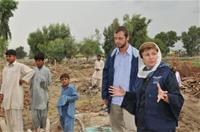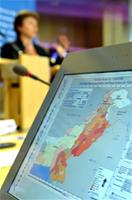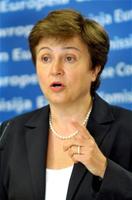Kristalina Georgieva: Help makes the difference between hope and despair
Ralitsa Kovacheva, August 31, 2010
 "Before getting better, it will become worse.” This is how the European Commissioner for Humanitarian Aid Christalina Gheorghieva described the situation in flooded Pakistan. She met with journalists in Brussels to share her impressions from the situation in the country.
"Before getting better, it will become worse.” This is how the European Commissioner for Humanitarian Aid Christalina Gheorghieva described the situation in flooded Pakistan. She met with journalists in Brussels to share her impressions from the situation in the country.
17 million people are affected by the floods, 1.2 million houses are destroyed. People have no shelter, no food, no water and medication. Many people are trapped in inaccessible areas - whether due to high waters, or because of fighting with the Taleban in the North.  Providing life-saving tools is humanitarian workers' number one concern. Especially to the most vulnerable - women and children. We must prevent chaos and epidemics, Commissioner Gheorghieva said and compared the situation to that in Haiti after the earthquake earlier this year in terms of a well organised and focused humanitarian response.
Providing life-saving tools is humanitarian workers' number one concern. Especially to the most vulnerable - women and children. We must prevent chaos and epidemics, Commissioner Gheorghieva said and compared the situation to that in Haiti after the earthquake earlier this year in terms of a well organised and focused humanitarian response.
 The EU Commissioner outlined a clear plan for action: tomorrow, when the waters retrieve, we should help the country to restore agriculture so that people would not miss the season of sowing, as this would cause a food crisis next year. A primary task in the future is to help Pakistan restore the infrastructure - roads, homes, schools and hospitals - in a way that would increase the country's resilience to natural disasters, because now it is among the most vulnerable to climate change.
The EU Commissioner outlined a clear plan for action: tomorrow, when the waters retrieve, we should help the country to restore agriculture so that people would not miss the season of sowing, as this would cause a food crisis next year. A primary task in the future is to help Pakistan restore the infrastructure - roads, homes, schools and hospitals - in a way that would increase the country's resilience to natural disasters, because now it is among the most vulnerable to climate change.
The European Commission has already provided 70 million euro aid for Pakistan, which with the contributions of Member States now exceeds 210 million euros of European aid. In the next three years the European Commission has to allocate 225 million euros of development aid to Pakistan, but because of the disaster the amount will be reviewed, Gheorghieva said during her visit to devastated areas.
The situation in Pakistan will be discussed at the “Gymnich” meeting of EU foreign ministers on September 10 and in the European Parliament, which resumed work on Tuesday, August 31.
In a special declaration the groups of the Greens and ALDE in the EP called on the EU to be a more visible global player in terms of humanitarian crises, hailing the contribution to this of the "tireless efforts" of Commissioner Gheorghieva.
"Despite all the unequalled potential that has been given to the EU, it continues too be too discreet as a global player. It's important that the EU stands out and demonstrates what she does best: to assert herself in a visible way as the first humanitarian actor in the world, and excel in what is her true vocation, that of a real peace broker. But first things first, emergency humanitarian aid."
One of the ways for this to happen is precisely through the work of the Bulgarian commissioner. Given her awkward start because of the failure of the first Bulgarian nomination Rumyana Zheleva and the new and often underestimated portfolio, Christalina Gheorghieva has had to constantly prove its importance and the usefulness of her work.
Given her awkward start because of the failure of the first Bulgarian nomination Rumyana Zheleva and the new and often underestimated portfolio, Christalina Gheorghieva has had to constantly prove its importance and the usefulness of her work.
But Ms Gheorghieva is successful thanks to her immediacy and openness, with picturesque and evocative language, so uncommon for Brussels, which describes real pictures of suffering and destruction. This is important because she succeeds in making sympathetic even the cynical media, tending primarily to count the victims, and via them - the audience. It is important people to understand the need of assistance for the distressed, Christalina Gheorghieva says. As she wrote in her blog, in crisis situations the support of Europe and the international community is crucial because it is aid that makes the difference between hope and despair.